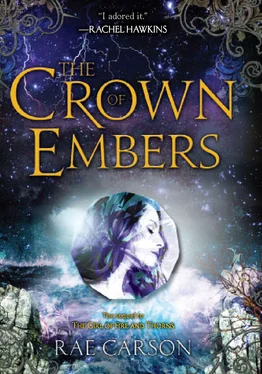He shrugs. “You’ll have to stomp a lot harder than that.”
My mouth opens in surprise. Then I realize he’s trying to goad me. It’s working.
Without breaking his gaze, I say, “Ximena, please fetch more pillows. Hector is going to need them.”
As she hurries away, he says, “Think you can learn this faster than your seven-year-old heir did?”
“Watch me.”
He grins.
We spend several more minutes stomping, with each foot, and then he teaches me to dislocate someone’s kneecap. By the time Ximena calls a halt, my heels ache, the muscles in my calves and shins tremble, and the scar on my abdomen stings with overstretching.
I’m surprised to realize I enjoyed myself. I rotate my ankles experimentally, relishing the burn. I feel strong in spite of my fatigue. Powerful, even. And Hector has always been easy to be with, since that day more than a year ago when he took a lonely princess on a tour of the palace to help her feel at home. I hope we have our next lesson soon.
I’VE neglected Father Alentín and Queen Cosmé’s delegation long enough to give offense. It’s especially insulting given that he now quietly aids Ximena in researching the Godstone. So I decide to host a small dinner in my private dining room, hoping to relax in the company of friends, share stories, rediscover the ease of having close companions.
But the mayordomo insists I also invite Conde Tristán and his foppish attaché, along with Lady Jada, whose Quorum vote I may need if we do not find a permanent replacement soon. He’s right—it’s the strategic thing to do. But my anticipation is replaced by dread. I had so hoped to indulge in an evening of not being queen .
By design, I am the last to arrive, for I can’t stomach the idea of making idle chatter while waiting to be served. As is tradition in Joya d’Arena, the table is low and surrounded by huge sitting cushions. Not for the first time, I consider drawing up a royal edict demanding the use of proper tables and chairs.
Hector and Ximena seat themselves on either side of me. I frown to think that I can’t even enjoy a small private dinner without their protective hedge.
I nod to Father Alentín and Belén, sitting at the other end. Lady Jada is directly across from me, and after greeting me warmly, she goes right back to gazing shamelessly at Conde Tristán sitting beside her. But the conde doesn’t notice because his gaze fixed on me the moment I entered and now does not waver.
I sigh as I reach for my glass of rose-hip wine, anticipating a long and tedious evening. If it were just Alentín and Belén, I would know exactly what to say, exactly how to be. I find that my anger with them has faded, so eager am I for the familiar.
To my relief, Conde Tristán is the one to open conversation. “Lady Ximena, how goes the late-night studying in the monastery?”
Everyone freezes. Belén becomes as dark and coiled as a storm cloud.
The conde looks around at us in alarm. “I’ve said something, haven’t I? Something wrong?”
Lady Jada says, “Oh, I’m sure it’s nothing. We just need to get to know each other.” She turns to me. “Isn’t that right, Your Majesty?”
My voice is dead flat when I say, “Your Grace, do tell me how you came to know about Ximena’s studies.”
He and his herald exchange a confused glance. The conde says, “I often walk at night, after everyone has gone to sleep. Lately I’ve been going to the monastery to pray. Last night I saw Lady Ximena with the ambassador from Basajuan.” He indicates Alentín with a lift of his chin. “I just thought . . . I know she used to be a scribe. . . . That is to say, I’ve started studying the scriptures myself lately, and I thought to chat about . . .”
I laugh the moment a good lie comes to mind. It’s a forced sound that will fool no one who knows me, but the conde’s face relaxes at once. “I didn’t mean to alarm Your Grace,” I say. “It’s just that we’ve kept it quiet intentionally. You see, not many people know that Basajuan’s monastery archive took some damage during the war. We’ve been working with them to restore what documents we can, even scribing new ones as necessary.”
He nods. “I’m glad to hear it. Small gestures will go a long way toward building goodwill with Queen Cosmé. Which is vital now that her country stands between us and Invierne.”
“Indeed.” I raise my wineglass. “To continued goodwill between Basajuan and Joya d’Arena.”
Everyone raises their glasses and echoes the sentiment with polite relief.
“Were I you, though,” the conde muses, “I would be scouring the archive for clues about the Godstone.”
I stare at him. Is he bringing up these things out of innocent coincidence? Or is there a purpose to his comments?
“Why is that?” Ximena asks, and I can’t be the only one who recognizes the dangerous edge in her voice.
“Well, the animagus, for one. The one who martyred himself. Invierne still wants that stone desperately. I must confess that I am deeply curious as to why. And I’m not the only one. The whole city is talking about it. Maybe the whole country.”
“Maybe they’re afraid of it?” Lady Jada offers. “Her Majesty destroyed several of their most powerful sorcerers with it.”
Tristán shrugs. “There have been bearers, Godstones, every hundred years for two millennia. Why go to extremes only now?”
I feel I should interject something, though I don’t know what. They’re talking about me, the most important part of my life, as if I’m not even here. There are probably exchanges like this going on all over the country.
My Godstone. Me. A dinner-table conversation. I suppose that as queen, I belong to everyone a little.
“You know what I think?” Lady Jada says.
“I would love to know,” I tell her sincerely.
She lifts her chin. “I think they want this land back.”
“Oh?”
“I would be a poor mayor’s wife if I didn’t know my history,” she says primly. “My tutor says that a few centuries after God dropped the first families onto this world, one family went mad with ambition, gobbling up land and resources through marriage and war. But the others united against them and drove them out. They fled into the wilderness, the curse of God upon them, and became the Inviernos.
“They were driven out,” she continues. “Everyone knows Brisadulce is the most beautiful city in the world. I think the Inviernos want it back.”
Her history is mostly right, but her assessment of our capital is not. Brisadulce is an isolated city, surrounded on all sides by natural disaster, forced to trade for the bulk of its supplies. It remains our capital from long tradition and history and maybe nostalgia. But the land itself is impractical, even useless. Why would the Inviernos want it when they could pursue Puerto Verde or the lush rolling hills of the southern holdings instead?
I say solemnly, “A well-conceived theory. Maybe you’re right.”
Ximena chokes on her wine.
The kitchen master enters, accompanied by wait staff carrying trays piled with shredded chicken, corn tortillas, and fresh fruit slices. My mouth waters to see honey-coconut scones, my favorite. They’re still hot from the oven; the honey glaze melts down the sides.
Lady Jada claps her hands. “Pollo pibil! It was the king’s favorite, I hear.” She points to the plate of chicken.
“It was,” Hector says. “He first encountered it in my father’s hacienda.” At my questioning look, he says, “One summer King Nicolao’s ship got caught in a storm and ran onto the reef. He and Prince Alejandro took shelter with us while the hull was repaired. It’s how we met.”
Читать дальше











